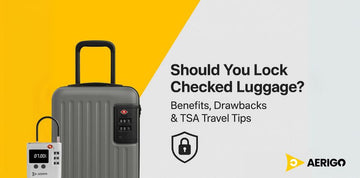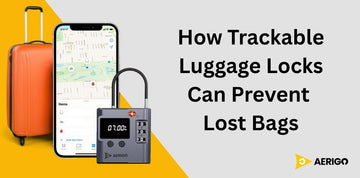
When you travel, you need to check your luggage. A common question is whether you should lock your bags. The answer is yes. Locking your checked luggage keeps it secure and gives you peace of mind. A locked bag is harder to steal and can help protect your belongings while you travel. Certainly, it comes with some challenges, such as TSA inspection and possible damage. The benefits and challenges associated with the lock are to make informed decisions. This blog discusses whether locking checked luggage is an informed decision for travel needs.
Benefits of Locking Checked Luggage
There are several benefits of locking checked luggage like having a secure and peaceful trip. However, there are other benefits too. Let’s discuss them in brief:
Protection Against Theft
Though luggage locks will not prevent theft or tampering completely, they may act as a deterrent. A locked bag should include a certain amount of effort to get into it, which will dissuade opportunistic thieves or unauthorized individuals. Take the case of an airport baggage handler. For instance, some might bypass those with locks and heads to entice easy targets while your belongings are protected from theft.
Prevention of Accidental Opening
Travel can ruin your luggage. Bags might get thrown and squished during transportation. Locks keep zippers from accidentally opening because the bag gets pushed around. This is especially meaningful for soft-sided luggage, where zippers are more vulnerable. As this happens, the lock keeps your items in one piece for the trip.
Drawbacks of Locking Checked Luggage
There are certain disadvantages to loch your checked-in luggage. Let’s discuss them in brief:
TSA Inspection Issues
Using non-TSA-approved locks may result in a situation where the TSA might be required to breach it for inspection. For instance, TSA agents may sometimes open bags for security reasons, and the associated regular lock cannot be opened without breaking it. However, TSA-approved locks allow the TSA to unlock your bag without causing any destruction through a master key. Remember that TSA-approved locks are only recognized in the USA, while security agents may have a different tool in other countries.
Limited Security
Locks offer merely the most elementary protection. Experienced thieves or someone who really wants to get into your bag will also manage to open a lock, for instance, by cutting into the materials of your luggage. In addition, the TSA does not reimburse stolen property, even if it occurred at a security check. A lock deters opportunistic theft, but it is not a foolproof method.
Potential Damage
Often, due to baggage handling, locks become damaged and may also be worn out during inspection, including TSA-approved locks. Damaged locks are not covered under security personnel or mishandling. These limitations may cause you to rethink whether the risk involved is worth it.
Tips to Improve the Security of Your Checked-In
Everyone wants their luggage to be secured while they are traveling. So, to enhance the security of your luggage here are some tips:
Using TSA-Approved Locks
Having a TSA-approved lock on your checked luggage is a necessary accessory. It attaches a universal master key for TSA employees to open closed bags for inspection purposes without breaking the lock. So, instead of dealing with the annoyance of broken locks, you can allow full compliance with TSA regulations. Moreover, using a TSA-approved lock can help streamline the inspection process, allowing you to get through security checks more efficiently while keeping your valuables safe.
Keep Your Valuables Safe in Carry On
Even locks shouldn't be an excuse for leaving valuables, such as electronics, jewelry, medications, and important documents, alone in checked baggage. Carry them in your hand luggage or keep them on your person. Checked baggage is subject to many risks, such as loss or damage; by carrying valuables, you can better control the items and enjoy peace of mind.
Type of Luggage
Soft-sided baggage requires a little extra supervision because it tends to be tampered with more easily. Although it lacks a lock function, hard-sided baggage offers extra durability, making it somewhat resistant to breaches. Choose luggage based on your travel needs and risk level.
Research Security Practices to the Destination you are Travelling
Research airport and customs inspection processes for international travel. Different countries have their protocols and tools in contrast to the TSA that could affect your choice to lock your luggage.
Conclusion
When it comes to safe-locking your checked-in luggage, it depends on your travel plans, your baggage, and your individual preferences. Locking does prevent theft and accidental openings to some extent but does not provide great security. It could also cause damage when inspected. One of the TSA-approved locks would do the trick, while one can put the valuables in hand luggage. Therefore, being well prepared, using known luggage brands, and knowing enough about airport security restrictions make traveling safe and reassuring.
If you want to secure your travel with the most trusted TSA lock, choose the Wander Lock by Aerigo. The lock meets all the parameters set by the US government and can connect to Apple's Find My. Choose Wander Lock for a better and safer travel experience





